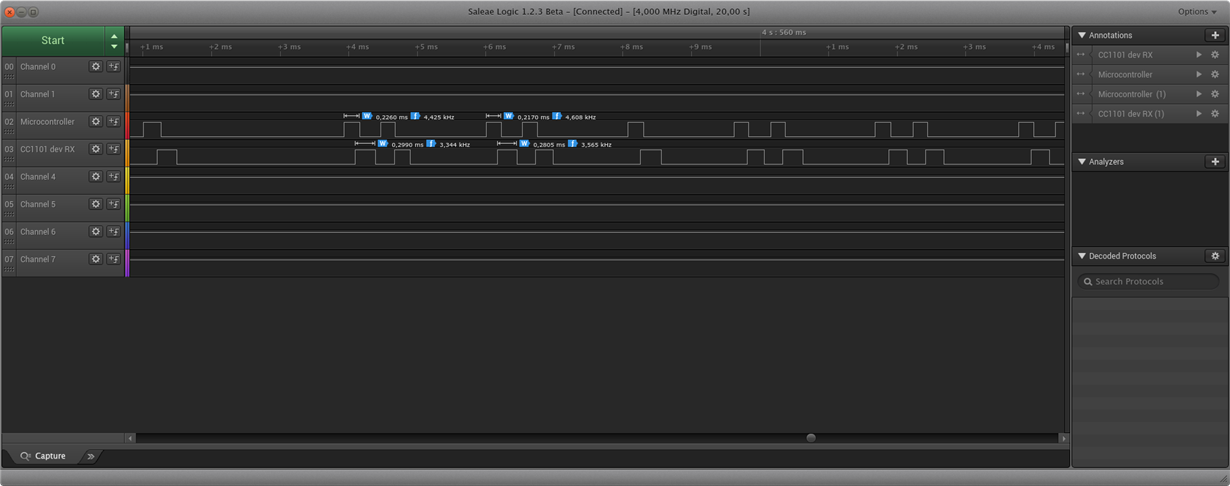Hi guy,
im using a cc1101 in asynchronous serial mode. Im using this configuration:
RF_SETTINGS code rfSettings = {
0x0B, // IOCFG2 GDO2 Output Pin Configuration
0x0C, // IOCFG0 GDO0 Output Pin Configuration
0x47, // FIFOTHR RX FIFO and TX FIFO Thresholds
0x32, // PKTCTRL0 Packet Automation Control
0x06, // FSCTRL1 Frequency Synthesizer Control
0x10, // FREQ2 Frequency Control Word, High Byte
0xB1, // FREQ1 Frequency Control Word, Middle Byte
0x21, // FREQ0 Frequency Control Word, Low Byte
0xF7, // MDMCFG4 Modem Configuration
0x93, // MDMCFG3 Modem Configuration
0x30, // MDMCFG2 Modem Configuration
0x00, // MDMCFG1 Modem Configuration
0x00, // MDMCFG0 Modem Configuration
0x15, // DEVIATN Modem Deviation Setting
0x18, // MCSM0 Main Radio Control State Machine Configuration
0x14, // FOCCFG Frequency Offset Compensation Configuration
0x04, // AGCCTRL2 AGC Control
0x10, // AGCCTRL1 AGC Control
0x50, // AGCCTRL0 AGC Control
0xFB, // WORCTRL Wake On Radio Control
0x11, // FREND0 Front End TX Configuration
0xE9, // FSCAL3 Frequency Synthesizer Calibration
0x2A, // FSCAL2 Frequency Synthesizer Calibration
0x00, // FSCAL1 Frequency Synthesizer Calibration
0x1F, // FSCAL0 Frequency Synthesizer Calibration
0x81, // TEST2 Various Test Settings
0x35, // TEST1 Various Test Settings
0x09, // TEST0 Various Test Settings
0x14, // VERSION Chip ID
0x80, // RSSI Received Signal Strength Indication
0x01, // MARCSTATE Main Radio Control State Machine State
0x94, // VCO_VC_DAC Current Setting from PLL Calibration Module
};
paTable = { 0xC0, 0x12 }
im generating a very precise signal from the microcontroller to the asynchronous tx signal. i've already checked the output signal of the microcontroller and the signal is fine. but when i use a 433Mhz receiver connected to a logic analyzer the signal shows some deviation.
I just want to get the exact mcu output signal to be generated. I really have no idea where the davation is coming from. I tried different baudrates but that doesnt seem to have any effect on the precision. The configuration is ment to be used for controlling remote switches (kaku) etc.
I also use the cc1101 for receiving. i use a input capture timer from the microcontroller. This makes it important that only, and only when someone is transmitting a signal, the signal gets generated onto the asynchronous rx.
Does somebody has any idea where the deviation is coming from?
Great thanks!


